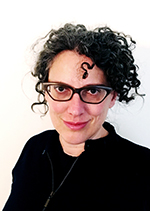Transformative Outcomes Through Circularity
Jenny Carney brings a holistic perspective of sustainability solutions to Northwestern's MSES program, where she teaches a course on the circular economy.
Jenny Carney made a realization in 2004, soon after receiving her master's degree in forest ecosystem ecology. She did not want to spend her career documenting environmental declines.
She wanted to work on solutions to prevent those declines.
 Today, Carney does just that as senior vice president at professional services consulting firm WSP, where she works with the sustainability, energy, and climate change team. She also teaches Circular Economy within Northwestern's Master of Science in Energy and Sustainability (MSES) program. MSES is jointly offered by Northwestern Engineering and the Paula M. Trienens Institute for Sustainability and Energy.
Today, Carney does just that as senior vice president at professional services consulting firm WSP, where she works with the sustainability, energy, and climate change team. She also teaches Circular Economy within Northwestern's Master of Science in Energy and Sustainability (MSES) program. MSES is jointly offered by Northwestern Engineering and the Paula M. Trienens Institute for Sustainability and Energy.
Carney specializes in sustainable real estate, built environmental decarbonization, zero waste and circular economy, and optimizing corporate sustainability initiatives for community benefit.
"I am really animated by seeing sustainable solutions become manifest in communities," Carney said. “I love that clean energy is now so visible. I’m excited for the point in the future when you can just as readily see circular economy infrastructure out in the world."
Carney found her way into sustainability after another realization.
When she started focusing on environmental solutions, she was involved with the U.S. Green Building Council. At that time, green buildings were mostly connected with high-end real estate.
"I had worked on hundreds of LEED-certified projects and was honored as a LEED Fellow without being fancy enough to work or live in a certified building," she said. "So the question was, how can we get these worthwhile sustainability practices into all buildings, benefiting all people?"
Her focus became helping others help the environment. In 2014, Carney co-founded BIT Building, an initiative to enable widespread adoption of green building operations and maintenance best practices. Today, BIT Building is an operations program focusing on the 16 best practices most relevant for buildings to become more water and energy efficient, more sustainable, and better performing.
Carney began to work with companies to integrate environmental justice into renewable energy procurement strategies. In 2022, she co-authored a report for Microsoft that detailed the company's approach to that integration in the hopes that other companies would take on similar initiatives.
That same year, Carney's WSP team served as technical advisors for the City of Chicago's Climate Action Plan. A primary focus of the plan was its careful intention to center the needs and priorities of environmental justice communities while ensuring local and equitable co-benefits to climate action investments.
"My work with the City of Chicago sharpened my understanding of how sustainability solutions can best serve communities," she said, "which is a lens I now try to bring into my work with the private sector."
It also is a lesson she imparts on her MSES students. Her class is focused on circularity, but she approaches the concept from a broad perspective.
"I intend for students to come away with an appreciation for systems thinking and how implementation minutia can make or break the effectiveness of a sustainable solution," Carney said, "and that strong relationships are often the foundation of transformative outcomes."
Carney's goal is to arm students with technical and non-technical skills to make a difference, while at the same time explaining the complexity and viability of a circular economy. To do that, she teaches students why existing linear economy systems are structured the way they are, who has the most interest in keeping systems the way they are, and where are the most effective avenues for change.
"I appreciate the extent to which the standards and frameworks that govern this work are not laws set in stone, but are shaped by people and sometimes untested theories of change," she said. "As such, they should be challenged, reworked, and keep evolving until they are doing the jobs we need them to do."